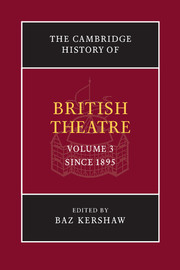Book contents
- Frontmatter
- Part I 1895–1946
- Part II Scottish and Welsh Theatres, 1895–2002
- 9 Towards national identities: theatre in Scotland
- 10 Case study: Ena Lamont Stewart’s Men Should Weep, 1947
- 11 Towards national identities: Welsh theatres
- 12 Case study: refashioning a myth, performances of the tale of Blodeuwedd
- Part III 1940–2002
- Bibliography
- Index
- References
12 - Case study: refashioning a myth, performances of the tale of Blodeuwedd
from Part II - Scottish and Welsh Theatres, 1895–2002
Published online by Cambridge University Press: 28 March 2008
- Frontmatter
- Part I 1895–1946
- Part II Scottish and Welsh Theatres, 1895–2002
- 9 Towards national identities: theatre in Scotland
- 10 Case study: Ena Lamont Stewart’s Men Should Weep, 1947
- 11 Towards national identities: Welsh theatres
- 12 Case study: refashioning a myth, performances of the tale of Blodeuwedd
- Part III 1940–2002
- Bibliography
- Index
- References
Summary
No text has stimulated a wider spectrum of theatrical presentations and adaptations in Wales than the story of Blodeuwedd, the woman made of flowers, from the fourth of the medieval tales known as the Four Branches of the Mabinogi. Indeed, from 1948 onwards the changing face of theatre in Wales is mirrored in the different stagings of the Blodeuwedd story. This chapter explores the varying cultural moment of each major production based on the myth.
The full range of tales, the Mabinogion, has long been regarded as the crown of Wales’s classic imaginative literature. First translated in three volumes by Lady Charlotte Guest in 1846, then issued as a popular single volume in 1877, the tales became much more widely available in 1948 through Gwyn Jones and Thomas Jones’s now standard translation. In the early 1950s Dylan Thomas, aware that his own first name came from the Mabinogion, in Under Milk Wood has the Revd Eli Jenkins speak of an ancient Llareggub, ‘before the Celts left the Land of Summer and where the old wizards made themselves a wife out of flowers’. The Mabinogion have been a major source for Welsh-language and non-Welsh writing alike, the most popular tale remaining that of Blodeuwedd.
- Type
- Chapter
- Information
- The Cambridge History of British Theatre , pp. 273 - 288Publisher: Cambridge University PressPrint publication year: 2004



